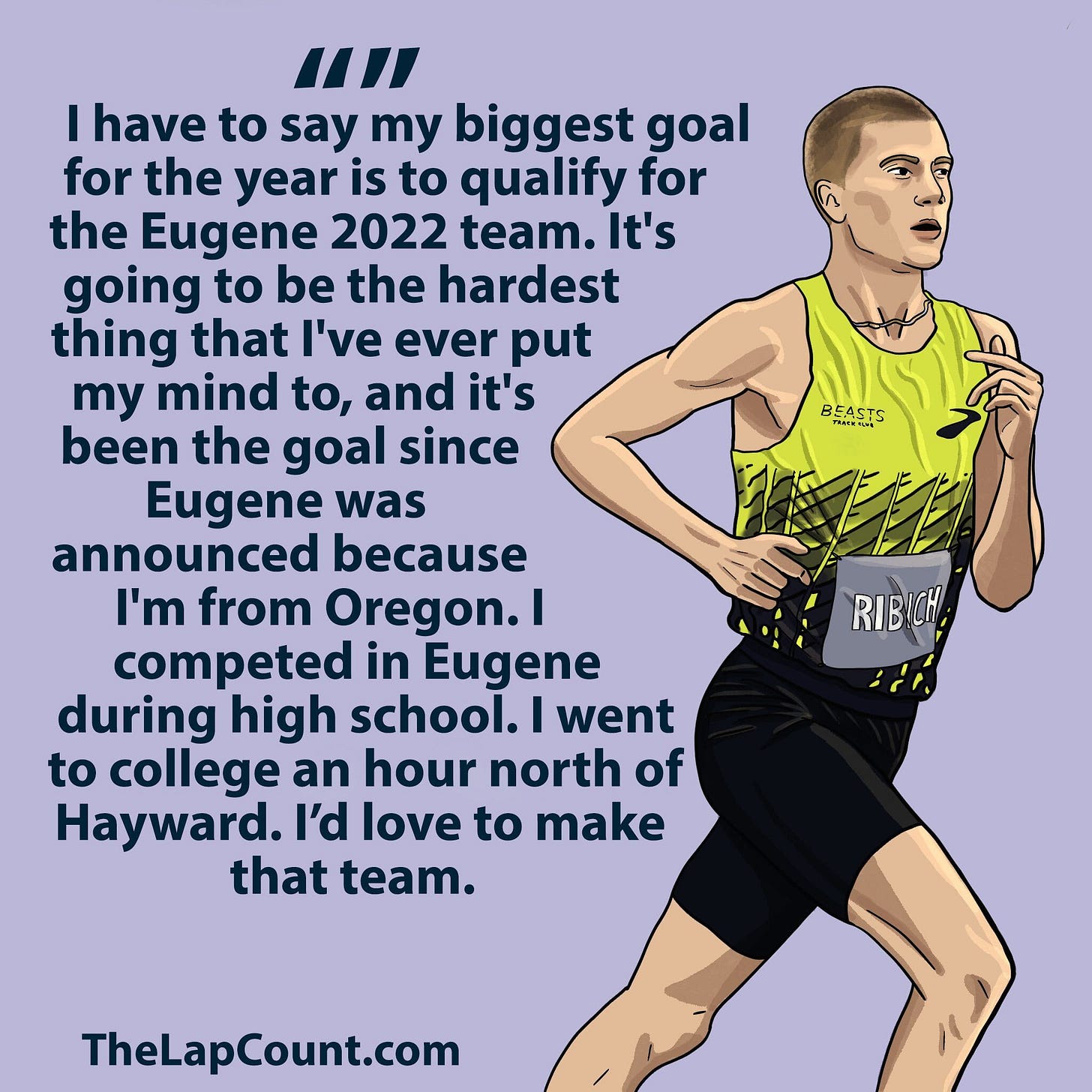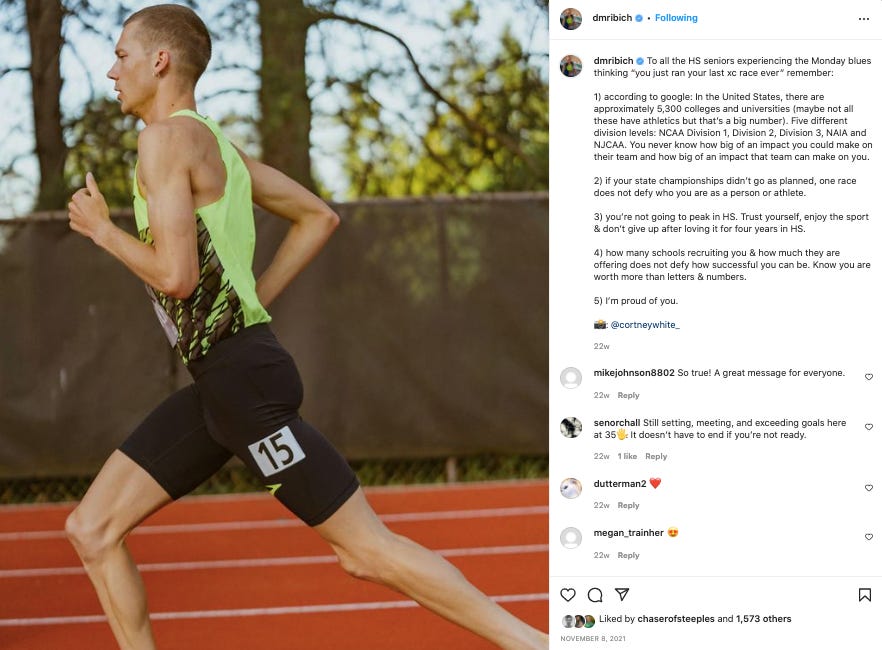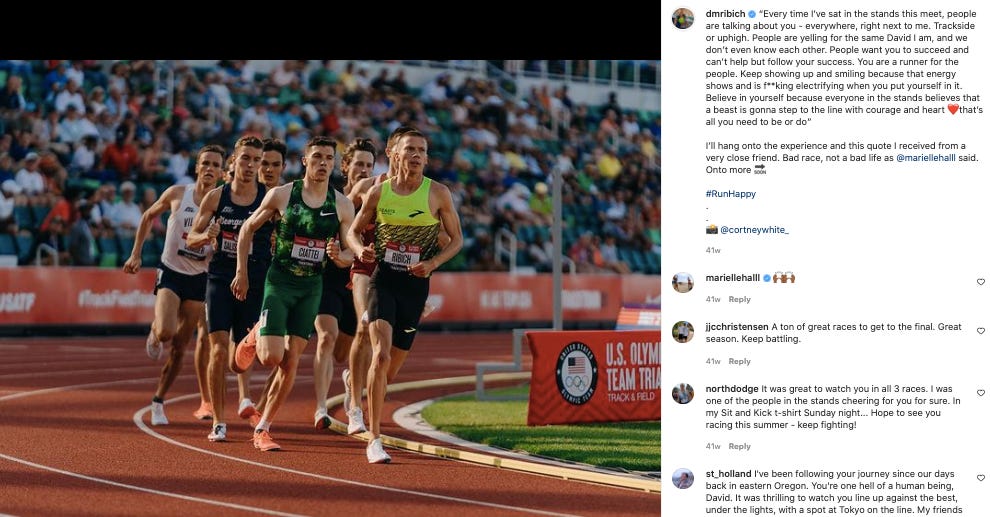The Victory Lap: David Ribich🏆
This week we welcome Brooks Beast athlete David Ribich to the Victory Lap! He chats with us about the different approach he has to as a professional compared versus during his D2 college days, how impactful Josh Kerr’s bronze medal was to their team, and much more. David also co-hosts the popular running podcast Sit and Kick and talks with us about what surprised him the most since starting it. If you’re in Southern California be sure to head to Sound Running’s Track Meet on May 7th to watch David and his teammates take a crack at the 5k standard.
When did you discover you had a talent for running and did anything specific draw you to the sport?
I guess when you talk about, like “knowing” or “the gift,” or whatever, it came with winning a race. My seventh-grade year in cross country, my first ever race, I won it. And all of a sudden I was like, oh, so like, this is what winning feels like… this is what confidence feels like!
For me, it wasn't necessarily a fast time or some super remarkable thing that pivoted my mindset. It was more just that initial feeling of being good at something, because it was really the first thing that immediately separated me from other people.
And I preach this a lot. But when I was younger, being as small as I was — I was like the classic skinny, wiry, underdeveloped kid — I went from being that to the runner guy. “Oh, you're just skinny because you're a runner.” That kind of disassociation from my inability to grow facial hair or pick-up girls or anything, it quickly just became a little identity for me. And then as I continued to get further and further along in the sport, the identity kind of blended in with it.
Are you someone that gets more enjoyment out of the competition aspect of the sport or are you someone who is more in love with the process of getting to the competition?
I love the thrill of competing. I love just going out and nearly dying, trying to break everyone around me. It's just so much harder to do at the professional level.
When I got into the professional scene, I almost had to re-approach everything. In college we would race to train — like, we would pick random races throughout the year just to say, “okay, this slot, do this tactically, during this 1500 do this.” Putting on a kit and kind of adding emphasis on a single day is really fun for me.
But as you get to the professional scene, you see a lot less start lines and a lot more training cycles. And so I've had to try to adapt to that. I would say that some inconsistencies that I've had at the professional level have actually just stemmed from me still trying to figure out who I am as a competitor and a process-oriented runner.
That’s something I definitely struggled with as a professional. The further away I got from winning, the whole process side felt much less natural. What’s something you’re working on improving right now in training?
Something that I'm trying to work on is just the consistency of hitting a Tuesday and Friday session well, then knowing that Monday, Wednesday, Thursday, Saturday, and Sunday are build-ups for those two days a week.
Previously, I would put a lot of emphasis on every single day. And I would think, okay, I'm at the start line of a race. I've done 100 days of consistent running, 100 days of mental focus. And then I would assume the race would take care of itself. The reality is the race doesn't take care of itself.
And I would say now, seeing that, I just try to put emphasis on Tuesdays and Fridays, so I can home run or check all the boxes on workout days. So I've just been trying to put a mental focus on workouts as well to just literally get me ready to race because opportunities are far and few.
I’m close to it, but obviously not like you whose in it – has there been an adjustment in the men’s 1500m training or race-prep given how that race has changed over the last two years?
On the domestic scene I think a lot of that credit can go to Josh Kerr for being an absolute psychopath and just wanting to say “alright, see you later!” and breaking people from the front. And that's what you'll see now with Olli Hoare or even Justyn Knight as a strength guy.
I would actually say the 1500 is turning into this long sprint. But it's getting further away from the 800 and closer to the 5000 in preparation, in my personal opinion.
Now, if you can run a fast 5000, I think that's a bigger sign that you can run a fast 1500, whereas in previous years when I would run like, 1:48 for an 800, I’d think “I'm ready to run under 3:40.” And now I'm checking these aerobic boxes before thinking that.
Look at the way Tokyo was run. Everyone can see from all the stats and the analytics of that race that it was not a slow pace. They're going out in 1:51, 1:52, which makes it feel like it’s a speed race.
But the reality is, it's going out in 1:52, then hold that for 700 meters, and still kick. You have to be so frickin’ strong. When you come down to the U.S. Championships and you look at the Olympic Trials, I mean, Centro’s run 13:00. Cole Hocker was at PAC 12s and did the 800 and the 5000. He didn't even do the 1500!
For the sake of transparency, I wanted to do the 5000 at the Trials. We built all year from January, all the way up until June for me to run the 5000. I consider myself a 5K guy.
But I was 26th, the first one out, on the entry list for the 5000, and I was the last one in for the 1500, so I had to do the 15. I wasn't planning on doing the 15, but with that 5000 strength I was able to get through the first two rounds off strength and then the final had a tough day for other reasons.
But my point is when you look at Tokyo, those guys set the Olympic record in the semifinal. Clearly the entire world is now looking at the 15 as something where if you want to be world-class — even if you want to make the U.S. team — you've got to be strong.
Speaking of Tokyo, what has Josh Kerr’s bronze medal done to your group?
Josh could speak volumes on that whole thing because I think that he's, for one, validated himself and his career. But that's not where he wants to end, and he's always building towards a legacy. He flat out said, “I don't want to be recognized next year as an Olympic bronze medalist.”
His mindset and his focus is helping drive this group forward. Look at the success that we had in 2021 for the Olympic Trials compared to 2016. I mean, we had three people finish fifth at the Trials. That's so damn close to making the Olympic team. I think those three athletes do still have legitimate shots all the way around.
And that's before Josh's medal! You'd be stupid to think that Josh wasn't going to win that medal. And that's what we're all building off of. We're building off his momentum. Our momentum. Everyone had this Olympic mindset building up to where Josh got that medal. It was validation that we are all doing everything that we need to do. We just need to play our cards right and battle on the day.
He Facetimed all of us between the race and the podium. And that was one of the most incredible moments of my career, and it's not even about me. It was about Josh and the things he accomplished.
Now as an outsider looking in, you can say, “okay, that team has a medal,” but everyone on our team is so hungry and wants to get at it so hard that our team will not be defined by Josh's medal. But we certainly have a good starting point with it.
Are you enjoying The Victory Lap? Then you probably know a teammate who would as well! What a great way to give someone some inspiration in their mailbox each week and to also help elite athletes in the process. This initiative has now raised over $19,400 for athletes, with all proceeds going back to those whose stories we share.
Is there anyone you draw inspiration from? Doesn’t have to be a track person.
I would hate to say Josh in this scenario. But I will, because I actually do draw inspiration from him and I think that's what makes him such a good teammate.
He's going to be someone that makes you think about the right things — like, good race or bad race, he’s fantastic to talk to. And that's why I'm so thankful to do the podcast with him. As great as those episodes are and as much appreciation as our fans give us, those are also highly therapeutic for me because I get to learn and speak with one of the best athletes in the sport.
He's one of my best friends. And so I'm not going to put him on a pedestal by any means — everyone in our team has said they're going to beat Josh… this year, after he wins an Olympic medal! Which I think is hilarious. I'm certainly one of them. When I race Josh in the 5000, I want to bury him.
And so what I'll draw from Josh is that he is one of the most disciplined athletes mentally, if not the most disciplined athlete I've ever met personally. And I draw inspiration from him just because of his willingness to dedicate 100 percent of his mental focus to a single task and execute it.
He comes in in the fall out of shape. Had a good holiday. He was in Hawaii. He was nowhere near the group in terms of training. But yesterday we just did a workout and I won't speak for his training but he put us all down in an aerobic 5000-type workout. And so it's like he's very, very in-tune with the scheduling of training.
He'll turn down opportunities that are good. Like, he turned down Monaco in 2019 to gear up for the World Championships because he's like, “I'm trying to make a final, and trying to get a world medal. I don't need to be traveling to Monaco.” So he turned it down, and that's every single runner's dream, to run all-out in Monaco.
That would be a dream come true. But he turned it down just for the opportunity to race to the Championship well, and he did do well. So I would put Josh down as an inspiration, and you can go ahead and say that it was a really tough decision for me to do so. He doesn't get too big of a head, but yeah, he is a remarkable athlete and I think I think he gets a lot of flak for being very bullheaded and aggressive in the way that he communicates or in the way that he presents himself. But the thing is, it's not an act, he is who he is.
You two host the Sit and Kick podcast, what’s been your biggest takeaway since starting it?
I think that one of the coolest parts for me, honestly, is seeing the things that Josh and I didn't think would hit, hit really, really well.
Like we did like T-shirts and singlet drops, kind of for shits and giggles. But we ended up selling out very fast. The track and field community wants something to represent and wants something to identify with. So if that's the Sit and Kick community, then by all means we're going to help them feel represented and feel welcomed and just have a good time doing all the things that we're doing.
We had a kid named Zach who recently just ran New Balance Nationals. I think he finished second and was wearing one of our singlets! And it was so cool to see. Josh and I have talked about this a few times: we're interviewing these pros and we're having these really great conversations, the banter is hilarious, everything's great, but we're actually making a genuine impact that we didn't necessarily think we would do with communities ranging from high school, junior high kids to parents.
During the Olympic Trials, I was running around Pre’s trail and there's a mom literally pushing a stroller. She yells “David!” and I looked at my group and I didn't know she was talking to me, but I was the only David and she's like, “I love you and Josh's podcast.”
And so I would say that the biggest thing for me is actually the community impact of runners wanting to identify with our podcast. Like, that's so crazy. It's almost like we start these things almost just to make jokes and talk and shoot the shit with runners. But there's genuinely people whose lives are positively impacted because of it, even if it’s in the smallest of ways. It’s been awesome.
That sounds a bit more pleasant than the emails Kyle gets correcting the spelling of a single word. What’s the big goal of the year for you?
I have to say my biggest goal for the year is to qualify for the Eugene 2022 team.
It's going to be the hardest thing that I've ever put my mind to, and it's been the goal since Eugene was announced because I'm from Oregon. I competed in Eugene during high school. I went to college an hour north of it. If that's not my goal and if that's not what I'm working for every single day, then I probably should try to find a different line of work because that is the pinnacle.
It's not the Olympics, but for me, being in my home state, I want to be there and hear my name announced in Oregon. I'd love to make that team, whether that's in the 15 of the 5000. (I probably should figure that out here soon!)
I’ve got a 5000 coming up, May 7th at the Sound Running Track Meet. I'll do that with some of the boys and we can smash out the standard and check one of those boxes and then hopefully I can come back down into some 15s and really gear up for a great championship season.
It's going to be here in the blink of an eye. I mean, we're only two months away from the USA Championship. I just need to stay consistent and get into that racing mentality because it's not going to be easy to make that team and it's not going to be easy to get those standards. But I trust that I can do it with the workouts that I've done and the work that I'm about to do. I just have to believe in myself.
Thanks so much to David Ribich for taking the time to share his story with us. To continue following David’s career then you can follow him on Instagram, Twitter or subscribe to the Sit & Kick Podcast. Special appreciation to Brooks who has sponsored this week’s Victory Lap to make it available for all readers!





